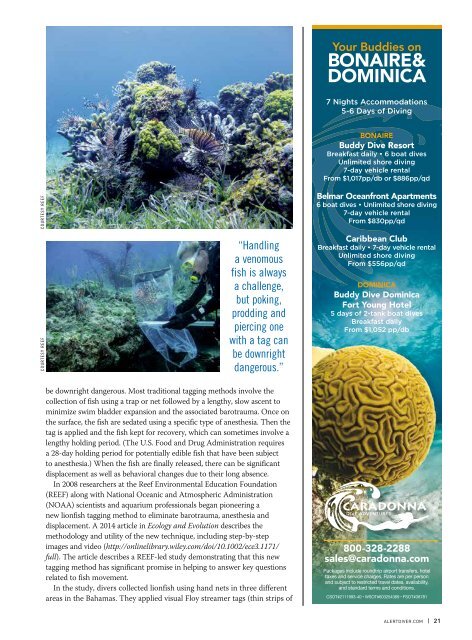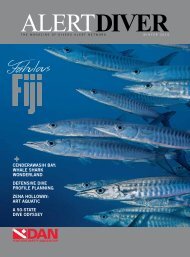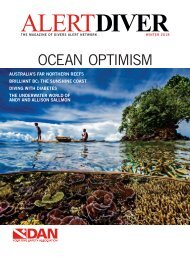AD 2016 Q2
As we pointed out in the spring 2013 edition of the Alert Diver, even being a dive buddy has potential legal implications. So, to bump this up a notch, what about the diver training organisations themselves? Where do they stand? How do they relate to South African law? Are they all considered the same under our legal system in spite of the differences in organisational structures and training programmes? How does this affect their respective instructors and trainee divers from a legal perspective? These are not exactly simple questions. It is certainly true that the respective training organisations differ in a number of ways. However, this does not imply that there are necessarily differential legal implications for each of them. In fact, under South African law, the legal principles are common in all matters. Therefore, if you suffer a loss and you (or your estate in the case of a fatality) wish to recover damages, the legal principles would be applied commonly; whether you are driving or diving. Although not a frequent occurrence, there have been quite a number of law suits associated with diving injuries and damages in South Africa. This is not surprising, as the occurrence of law suits is really a function of “numbers”. As training increases, so do the chances of injuries and, with it, the chances of legal recourse. So, it remains wise to insure yourself, your equipment or your business in a proper and effective way. But before getting back to the potential differences amongst the training agencies, let’s first explore the foundational legal principles on which any civil claim would be adjudicated: inherent risk, negligence and duty to take care.
As we pointed out in the spring 2013 edition of the Alert Diver, even being a dive buddy has potential legal implications. So, to bump this up a notch, what about the diver training organisations themselves? Where do they stand? How do they relate to South African law? Are they all considered the same under our legal system in spite of the differences in organisational structures and training programmes? How does this affect their respective instructors and trainee divers from a legal perspective? These are not exactly simple questions.
It is certainly true that the respective training organisations differ in a number of ways. However, this does not imply that there are necessarily differential legal implications for each of them. In fact, under South African law, the legal principles are common in all matters. Therefore, if you suffer a loss and you (or your estate in the case of a fatality) wish to recover damages, the legal principles would be applied commonly; whether you are driving or diving.
Although not a frequent occurrence, there have been quite a number of law suits associated with diving injuries and damages in South Africa. This is not surprising, as the occurrence of law suits is really a function of “numbers”. As training increases, so do the chances of injuries and, with it, the chances of legal recourse.
So, it remains wise to insure yourself, your equipment or your business in a proper and effective way. But before getting back to the potential differences amongst the training agencies, let’s first explore the foundational legal principles on which any civil claim would be adjudicated: inherent risk, negligence and duty to take care.
You also want an ePaper? Increase the reach of your titles
YUMPU automatically turns print PDFs into web optimized ePapers that Google loves.
Your Buddies on<br />
BONAIRE&<br />
DOMINICA<br />
7 Nights Accommodations<br />
5-6 Days of Diving<br />
BONAIRE<br />
Buddy Dive Resort<br />
Breakfast daily • 6 boat dives<br />
Unlimited shore diving<br />
7-day vehicle rental<br />
From $1,017pp/db or $886pp/qd<br />
COURTESY REEF<br />
Belmar Oceanfront Apartments<br />
6 boat dives • Unlimited shore diving<br />
7-day vehicle rental<br />
From $830pp/qd<br />
COURTESY REEF<br />
“Handling<br />
a venomous<br />
fish is always<br />
a challenge,<br />
but poking,<br />
prodding and<br />
piercing one<br />
with a tag can<br />
be downright<br />
dangerous.”<br />
Caribbean Club<br />
Breakfast daily • 7-day vehicle rental<br />
Unlimited shore diving<br />
From $556pp/qd<br />
DOMINICA<br />
Buddy Dive Dominica<br />
Fort Young Hotel<br />
5 days of 2-tank boat dives<br />
Breakfast daily<br />
From $1,052 pp/db<br />
be downright dangerous. Most traditional tagging methods involve the<br />
collection of fish using a trap or net followed by a lengthy, slow ascent to<br />
minimize swim bladder expansion and the associated barotrauma. Once on<br />
the surface, the fish are sedated using a specific type of anesthesia. Then the<br />
tag is applied and the fish kept for recovery, which can sometimes involve a<br />
lengthy holding period. (The U.S. Food and Drug Administration requires<br />
a 28-day holding period for potentially edible fish that have been subject<br />
to anesthesia.) When the fish are finally released, there can be significant<br />
displacement as well as behavioral changes due to their long absence.<br />
In 2008 researchers at the Reef Environmental Education Foundation<br />
(REEF) along with National Oceanic and Atmospheric Administration<br />
(NOAA) scientists and aquarium professionals began pioneering a<br />
new lionfish tagging method to eliminate barotrauma, anesthesia and<br />
displacement. A 2014 article in Ecology and Evolution describes the<br />
methodology and utility of the new technique, including step-by-step<br />
images and video (http://onlinelibrary.wiley.com/doi/10.1002/ece3.1171/<br />
full). The article describes a REEF-led study demonstrating that this new<br />
tagging method has significant promise in helping to answer key questions<br />
related to fish movement.<br />
In the study, divers collected lionfish using hand nets in three different<br />
areas in the Bahamas. They applied visual Floy streamer tags (thin strips of<br />
800-328-2288<br />
sales@caradonna.com<br />
Packages include roundtrip airport transfers, hotel<br />
taxes and service charges. Rates are per person<br />
and subject to restricted travel dates, availability,<br />
and standard terms and conditions.<br />
CSOT#2111993-40 • WSOT#603254369 • FSOT#38781<br />
ALERTDIVER.COM | 21









